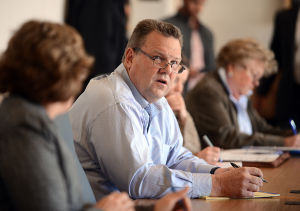forum
library
tutorial
contact

Tester Discusses Murky CFAC Future
by Jim MannThe Daily Inter Lake, March 26, 2013
|
the film forum library tutorial contact |

|
Tester Discusses Murky CFAC Futureby Jim MannThe Daily Inter Lake, March 26, 2013 |
"You are correct," Tester responded. "The company can get out of paying for cleanup."
 The question of whether a federal environmental assessment could or should interfere with a possible reopening of the Columbia Falls Aluminum Co. came up at a meeting Tuesday led by Sen. Jon Tester, D-Mont.
The question of whether a federal environmental assessment could or should interfere with a possible reopening of the Columbia Falls Aluminum Co. came up at a meeting Tuesday led by Sen. Jon Tester, D-Mont.
Tester told Columbia Falls city leaders and citizens about his frustrating history working with the plant's current owner, Glencore, and the Bonneville Power Administration on a power contract that would allow the plant to reopen.
Several times, he was able to get BPA to come to terms requested by Glencore, but the international commodities trading company would balk, citing other economic reasons such as low aluminum prices.
Columbia Falls Mayor Don Barnhart asked Tester if he thinks there is any possibility of reopening the plant, which has been shuttered since October 2009.
Barnhart pointed out that many of the skilled workers who ran the plant are no longer around and at some point there won't be a viable work force to resume operations.
"I'd still love to see it open," Tester said, adding that electricity prices are low but so are aluminum prices.
Tester said it reached a point where he and Sen. Max Baucus, D-Mont., recently contacted the Environmental Protection Agency, requesting a study on whether contamination at the CFAC property near the Flathead River would warrant a Superfund site declaration or preclude the site from being sold and used for other purposes.
"We should at least start the process of what role the EPA should play," said Tester, who has not heard back from the agency.
Barnhart conceded that waiting for Glencore to act has been an exercise in futility.
"Eventually, it wears on you to where you think you're being led on, you're being gamed," Barnhart said.
One Columbia Falls resident suggested that "it seems kind of silly" to get the EPA involved and then potentially halt that involvement to get the plant reopened.
Tester responded that the EPA's involvement largely will depend on the community's wishes.
"If the community doesn't want EPA around ... I think [the community] can play a big role in that," Tester said. "I would say that if the plant is going to reopen, [Glencore] better hurry up."
Don Bennett, president of Freedom Bank in Columbia Falls, questioned whether it would be proper to reopen the plant without cleanup.
"If there is toxic pollution, shouldn't that be mitigated if the plant opens or not?" Bennett asked.
From his experience working as a purchasing manager at the plant for years, City Council member Michael Shepherd attested to the likelihood there is contamination.
He said the materials that were used there were dangerous and the process of manufacturing aluminum was dangerous.
He recalled how truckloads of vermiculite regularly arrived at the plant from Libby to be used for leveling the aluminum pot lines. Employees "worked in that with no respirators for years and years," he said.
Shepherd described how aluminum pot bottoms would break down with cyanide and arsenic byproducts and how he suspects there were plenty of chemical spills.
There are, he said, "thousands of cubic yards of material that has to be removed" just because of the sheer volume of materials that moved through the plant since it opened in 1955.
Robert Smollack, who was an operations manager at the plant, said that when ARCO sold the plant to the Columbia Falls Aluminum Co. in 1985, there was a strict directive that all waste material be hauled away for proper disposal rather than be buried on site. But he added there is no telling what may have been buried in the previous 30 years.
Haley Beaudry, a longtime CFAC spokesman who has worked on reopening the plant for the last few years, said a Superfund declaration could make it very difficult to reopen.
Beaudry said the site may no longer be usable and the plant itself may be worn out after more than three years in the dark. Every time there is an evaluation of the cost of reopening, the cost goes up, he said.
However, Beaudry said there is a new development regarding BPA electricity that "changes the whole game" regarding the feasibility of reopening the plant. BPA recently offered another aluminum producer a 10-year power contract that also could be available to CFAC.
Tester agreed, saying that makes it far more possible for the company to operate during a period when aluminum prices are up.
After Tester signaled that he believes a site cleanup is possible, one person asked if Glencore, which is based in Europe, can be compelled to pay for a cleanup, and if not, whether taxpayers would be on the hook.
"You are correct," Tester responded. "The company can get out of paying for cleanup."
learn more on topics covered in the film
see the video
read the script
learn the songs
discussion forum
